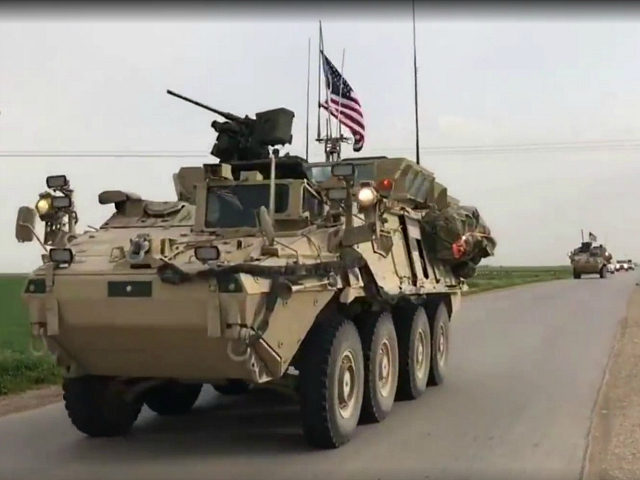Multiple reports have suggested an elevated American presence on the Syrian-Turkish border where clashes between the Turkish military and the Syrian Kurdish Peoples’ Protection Units (YPG/YPJ) have escalated in the past week.
The Kurdish outlet Rudaw published a video Friday of military vehicles with American flags traveling through Darbasiyah, northeast Syria, by the Turkish border. Eyewitnesses had told multiple news outlets that Turkish and YPG fighters had engaged in fighting in Darbasiyah this week, as the Turkish government confirmed airstrikes on YPG outposts throughout Syria. The Turkish government also attacked the Kurdistan Workers’ Party (PKK) in Iraq.
The Associated Press also reported Friday on an increased American presence in the region, citing the UK-based Syrian Observatory for Human Rights and “Kurdish activists.” “The U.S. role has now become more like a buffer force between us and the Turks on all front lines,” Mustafa Bali, identified as a Kurdish activist, told the AP, calling it a “warning message” to both sides to keep the focus on fighting the Islamic State (ISIS) and not each other.
The AP quotes Col. John Dorrian, “a U.S. spokesman for the international coalition against” the Islamic State, as calling the deployment of American troops to the area “ongoing.” The outlet notes that there is a presence of at least 200 U.S. Marines in northern Syria that arrived in the region in March, in addition to the already existing presence there.
Reuters cites another source, YPG commander Sharvan Kobani, as confirming that American troops would begin monitoring the area to keep the peace.
The PKK is a U.S.-designated Marxist terrorist organization. The YPG/YPJ, the militia of the Syrian Kurdish People’s Democratic Union (PYD), are allies of both the United States and the PKK, aiding American airstrikes with ground intelligence on the Islamic State while also collaborating with PKK fighters against ISIS. While mostly active in Turkey, the PKK has established a presence in northern Iraq, helping eradicate ISIS from the homeland of the Yazidi religious minority, Sinjar.
Turkish officials consider the PYD and the PKK the same organization and have petitioned the United States to cease cooperating with the YPG, among the most successful militias fighting ISIS in Syria or Iraq.
On Wednesday, Turkish airstrikes attacked both YPG and PKK positions in Syria and Iraq. In Syria, at least 18 YPG soldiers died in the attack. In Iraq, the attack targeting PKK outposts instead hit the Peshmerga, the militia of the Kurdistan Regional Government (KRG) of Iraq. The Iraqi Kurdish KRG opposes the presence of the PKK in the country, has rejected close cooperation with the YPG/YPJ, and maintains friendly relations with Turkey. The Turkish government has called the attack on Peshmerga a “mistake.”
To cement the alliance between Turkey and the KRG, Turkish President Recep Tayyip Erdogan met with Kurdish Prime Minister Nechirvan Barzani to express his lament for the slain Peshmerga on Friday. “Erdogan first expressed his condolences for the Peshmerga fighters killed and showed regret for the ones injured in Turkey’s bombing of PKK positions on Mount Shingal,” according to the KRG’s statement on the meeting. The statement reportedly did not mention an apology from Erdogan, merely “regret” and a demand that the PKK leave the region.
While mending fences with the KRG, the Turkish newspaper Hurriyet reports that clashes between Turkish soldiers and YPG fighters in Syria continued Friday. The Turkish military announced that it had “retaliated” to YPG attacks on Thursday and Friday in the region, claiming that the YPG had attacked eleven Turkish border posts.
While attacking U.S. allies on the ground, Erdogan said in a speech Friday that he was eager to meet President Donald Trump in May, when he is scheduled to arrive in Washington. “Our high-level talks with the Trump administration have been continuing since January 2017. I believe that we will open a fresh page with Trump,” Erdogan argued. Of the YPG, he said:
We can’t achieve anything with the logic “this terrorist organization is on my side, so it’s good, but the other one is against me, so it’s bad.” All terrorist organizations are bad. Thus, we need to continue our struggle against terrorist groups in joint solidarity. When we do that, the world will be safe from these gangs and killers.
Erdogan has longstanding ties to the Muslim Brotherhood, designated a terrorist organization by a number of Muslim-majority nations, including U.S. allies like Egypt and the United Arab Emirates (UAE).

COMMENTS
Please let us know if you're having issues with commenting.